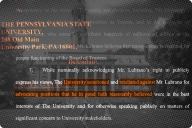You have /5 articles left.
Sign up for a free account or log in.
Students at California community colleges may no longer be able to repeat courses they have already passed, if a new proposal aimed at physical education and arts classes is adopted.
The primary faculty group at the 112-college system is backing the plan, which system officials presented on Monday to the Board of Governors. California's colleges have been hit hard with almost $1 billion in budget cuts and revenue shortfalls over the last few years, and will turn away 200,000 students this year. System leaders hope to save money by cutting back on course repeating, resulting in the ability to eliminate some sections and redirect the savings toward overenrolled courses.
The proposal would prohibit students from taking credit-bearing courses they have already passed. Remedial education courses, which typically are noncredit, would not be affected by the plan, which includes several exemptions.
For example, repeating courses that campuses of the California State University System or the University of California require for transfer in some majors, like multiple semesters in choir for a fine arts major, would be allowed. So would legally-mandated courses with annual requirements, or participation in courses related to intercollegiate athletics.
The proposed changes could have a substantial impact, given how common course repeating is at the state’s community colleges. Two years ago, slightly more than half of the students in the system, which enrolls 2.6 million students, repeated a class. About 500,000 students took classes three times or more, officials said, with 85,000 taking classes at least five times. (Those numbers, however, include students who repeated courses they failed.)
Many students take physical education classes multiple times, according to the system, as well as visual and performing arts courses, such as classes in music, theater and dance. That practice is a luxury the community colleges can no longer afford, system officials determined, and the Academic Senate for California Community Colleges agreed.
Michelle L. Pilati, the Academic Senate’s president and a professor of psychology at Rio Hondo College, said the faculty group worked with system leaders for two years on the proposal. They conducted focus groups with faculty members to sort through possible curricular changes, she said.
“Colleges have been watching this, knowing it’s coming,” said Pilati.
An example of an area where a revised curriculum could apply would be automotive repair, she said. Some students take certain courses multiple times, and the focus each time might be on a different automaker. But the students only receive credit for the original course.
“That should be transcripted,” Pilati said, and the college now will make the courses discrete, breaking the different automaker segments into separate course levels.
Some students will likely protest the policy. The Sacramento Bee reported on students who were unhappy that they will no longer be able to take ballroom dance multiple times, which some said provides the amount of practice necessary for them to progress as dancers. But nixing that option is one of the choices system officials said they need to make to free up money for more essential courses.
Under current rules, students cannot take credit-bearing courses as “community service” offerings, Pilati said. Community service courses are not subsidized by the state, and students pay full freight. The faculty group is pushing a proposal to change that, to allow students to repeat classes like ballroom dance as community service courses and cover the cost themselves.
The course repeatability changes, if passed by the board, would go into effect next year, system officials said.








